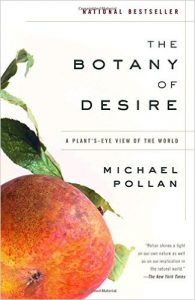I have a love-hate relationship with Pollan. He writes well, but for popular  science I often find it a bit lighter on science than I’d like. As with many writers who fall somewhere between journalism and pop science, you often get a long story about visiting a person and place instead of a detailed description of the science at hand.
science I often find it a bit lighter on science than I’d like. As with many writers who fall somewhere between journalism and pop science, you often get a long story about visiting a person and place instead of a detailed description of the science at hand.
Then again, I have never failed to enjoy one of his books. This one is about plants that have so deeply satisfied human desires (marijuana, apples, potatoes, and tulips) that humans have cultivated them extensively. The conceit here is that the plants have tapped our desire as a means of reproduction. This isn’t a new idea, and I suspect it wasn’t new in 2001, but it is very well explored. And, like all Pollan’s books, it has an engaging structure as it moves from topic to topic – tulips are beauty, apples are sweetness, potatoes are control, and marijuana is intoxication.
In short, I enjoyed it, and to the extent I have criticisms, they are basically unfair. I would prefer more depth in a book that is supposed to read more like an adventure travelogue of food. If that sounds like something you’d like, I recommend it.
